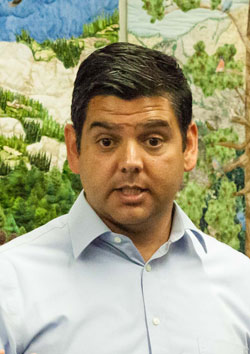
file photo
Local Congressman Dr. Raul Ruiz shared with the Town Crier his thoughts about President Donald Trump’s State of the Union speech.
Ruiz acknowledged that the inconsistency between the president’s actions and statements creates a basic skepticism about the intent of the speech.
Nevertheless, “There are some topics we’re very willing to work with him,” Ruiz said.
Among these are Ruiz’s long interest in reducing the cost of pharmaceuticals and medicine. Investing in an infrastructure for the future is another important issue, of which he feels there is room to reach concurrence.
“And important in this district is ending the HIV epidemic,” Ruiz stated. The 35th District has six times the national average of HIV cases, according to Ruiz.
Ruiz attended Trump’s State of the Union address Tuesday evening, Feb. 5, and brought David Sherman, a local officer with the U.S. Transportation Security Administration from Desert Hot Springs, as his guest.
Bipartisanship and cooperation between the administration and Congress is possible, Ruiz stated. His own experience with the administration’s plans to combat the opioid epidemic helped him see the potential.
“I attended meetings, and offered expertise and served up ideas as a member of the minority panel, and voiced my opinion during the mark-up,” he stated. But he is not convinced the ideas emanating from the SOTU reflect willingness and openness to multiple viewpoints.
Ruiz compared Trump’s current statements urging a plan to reduce the cost of prescription drugs with his administration’s past actions to reduce the healthcare insurance options for millions of people. Ruiz does not see a common path for these two efforts.
”When the president says reduce or cut prescription for all, that sounds good,” Ruiz said. “But look at what they have done … He has repeatedly tried to repeal medical expenses and benefits.”
In his statement, Trump urged bipartisanship on the battle against HIV and AIDs. “In recent years, we have made remarkable progress in the fight against HIV and AIDS. Scientific breakthroughs have brought a once-distant dream within reach,” he said. “My budget will ask Democrats and Republicans to make the needed commitment to eliminate the HIV epidemic in the United States within 10 years. Together, we will defeat AIDS in America.”
Ruiz is a strong advocate of this effort, yet he noted, “The president has tried to reduce coverage for HIV medicine and HIV patient access to Medicaid.”
Going further, Ruiz pointed out that eliminating the Affordable Care Act’s protection for pre-existing conditions often penalizes those with HIV. “This discriminates against them by raising the cost of health insurance.”
Working together, Congress and the president, requires an acknowledgement that Congress writes and passes the laws; the president reviews and signs them, Ruiz emphasized.
While he concurs that a federal infrastructure program would benefit the nation, he was not sure how Congress and the president could achieve agreement on funding. If the Republicans demanded that the added costs come from existing programs, Ruiz is just as adamant that last year’s tax law changes be modified.
“I think there are a lot of opportunities to look at how the tax law overwhelmingly and disproportionately benefited very few rich and powerful families in our nation,” Ruiz noted. “This is not based on conservative fiscal policies.” The infrastructure legislation has to ensure that everybody benefits, he urged.
Even the meaning of infrastructure may be another challenge. “Infrastructure of the future is guided by our imagination, not simply repaving dilapidated roads,” Ruiz said. For example, he believes broadband telecommunications capability is now a necessary element of current infrastructure.
This type of disagreement is similar to the stalemate on the funding for the border security, according to Ruiz. “A wall is a boondoggle and fiscally irresponsible,” he stated. “We need to invest in scanning and screening equipment for ports of entry. That is where 90 percent of drugs and guns and dangerous people come through.”
As he concluded, Ruiz stressed that future agreements and bipartisanship will be hostage to the details of each piece of proposed legislation. The president “ … didn’t give any policy details.”










